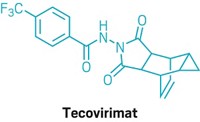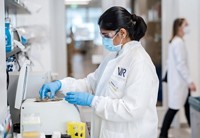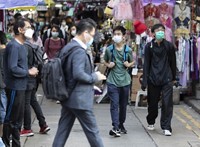Advertisement
Grab your lab coat. Let's get started
Welcome!
Welcome!
Create an account below to get 6 C&EN articles per month, receive newsletters and more - all free.
It seems this is your first time logging in online. Please enter the following information to continue.
As an ACS member you automatically get access to this site. All we need is few more details to create your reading experience.
Not you? Sign in with a different account.
Not you? Sign in with a different account.
ERROR 1
ERROR 1
ERROR 2
ERROR 2
ERROR 2
ERROR 2
ERROR 2
Password and Confirm password must match.
If you have an ACS member number, please enter it here so we can link this account to your membership. (optional)
ERROR 2
ACS values your privacy. By submitting your information, you are gaining access to C&EN and subscribing to our weekly newsletter. We use the information you provide to make your reading experience better, and we will never sell your data to third party members.
Infectious disease
Covid-19
Drug firms mobilize to combat novel coronavirus outbreak
Development of diagnostics, vaccines, and treatments is underway
by Lisa M. Jarvis
January 30, 2020
| A version of this story appeared in
Volume 98, Issue 5

Support nonprofit science journalism
C&EN has made this story and all of its coverage of the coronavirus epidemic freely available during the outbreak to keep the public informed. To support us:
Donate Join Subscribe
The World Health Organization has declared the fast-moving coronavirus outbreak in China a “public health emergency of international concern,” a measure that can spur coordinated global efforts to combat it. With infections steadily rising, major drug companies are mobilizing to develop diagnostics, vaccines, and possible treatments for the virus, 2019-nCoV.
According to WHO, as of Jan. 30 more than 7,800 people worldwide are confirmed to have been infected by the virus, and another 12,000-plus cases are suspected. Almost all of the cases are in China, where 170 people have died.
Although smaller biotech firms were among the first to publicly respond to the outbreak, big pharma firms say they have been quietly working on tests and treatments for several weeks. Roche has sent the first commercial diagnostic to China, and Johnson & Johnson says it is using the same technologies deployed for the rapid development of an Ebola vaccine to develop a 2019-nCoV vaccine.
Researchers from the Shanghai Institute of Materia Medica, Chinese Academy of Sciences captured a high-resolution crystal structure of the 3C-like protease of the virus, which they used to virtually screen for compounds that could block the enzyme. The team tested approved drugs, natural products, and traditional Chinese medicines, identifying 30 potential inhibitors. The candidates include five protease inhibitors and a dozen approved HIV therapies.
Chinese health authorities are exploring using those drugs, as well as antivirals that have shown efficacy against the SARS virus. At the request of Chinese agencies, AbbVie has donated a supply of its HIV medication Aluvia, a pill that combines the protease inhibitors lopinavir and ritonavir. Likewise, J&J has contributed 350 boxes of its HIV drug Prezcobix, which contains darunavir and cobicistat, to researchers and health agencies studying potential treatments. J&J says it will collaborate on screening other antivirals for efficacy against 2019-nCoV.
Gilead Sciences, meanwhile, is in discussions with US and Chinese researchers and clinicians regarding use of its antiviral remdesivir, which in animal models has shown activity against the related SARS and MERS viruses. Gilead developed remdesivir during the 2014 Ebola outbreak in West Africa but hasn’t received regulatory approval for it.
UPDATE
On Feb. 11, 2020, the Coronavirus Study Group of the International Committee on Taxonomy of Viruses officially named the novel coronavirus "severe acute respiratory syndrome coronavirus 2" (SARS-CoV-2). The temporary name for the virus was 2019-nCoV.





Join the conversation
Contact the reporter
Submit a Letter to the Editor for publication
Engage with us on Twitter